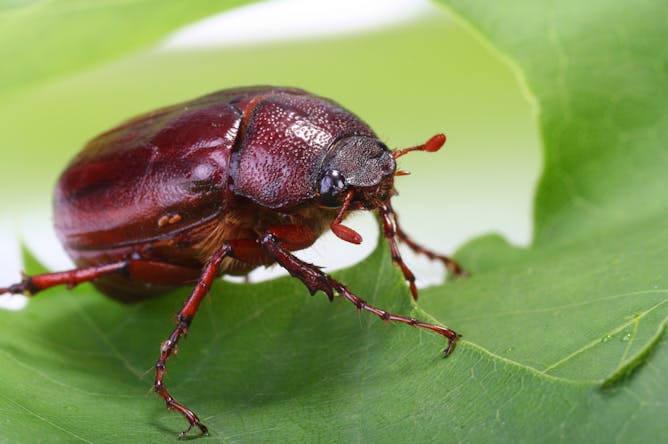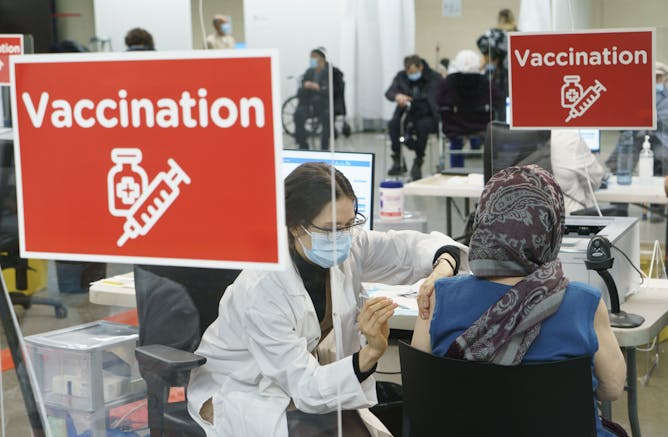|
Late May brings warm summer-like days, a holiday weekend and clumsy, creepy giant June bugs. June bugs fly like drunken pilots, crashing into porch lights and windows, and getting tangled in your hair. To an outsider, they’re a disaster flitting around on skimpy wings.
Today in The Conversation Canada, Paul Manning from Dalhousie University would like you to reconsider your feelings about the June bug, and he’s written an insider’s guide to the beetle to help you develop that fondness. They can be pests that destroy lawns and plants, but for birds, raccoons and skunks they’re an important high-protein food. Among some human insect-eaters, they’re a delightful addition to a salad: “Croutons from the sky.”
June bugs are “misunderstood creatures,” writes Manning, and he cautions against stomping on one. “You might be saving your lawn from the wrath of hungry white grubs, but you also might be robbing a barred owl, a pelecinid wasp or your neighbour of a protein-rich morsel.”
Also today:
All the best.
|
Hannah Hoag
Deputy Editor | Environment + Energy Editor
|

|
|

June bugs can be serious pests of ornamental and agricultural plants, lawns and golf courses, or they can be a crunchy snack for a bird — or human.
(Shutterstock)
Paul Manning, Dalhousie University
There is much more to these chunky beetles of early summer than what first meets the eye.
|

Intake workers assist visitors at an immigrant and refugee vaccine clinic set up by Global Medic in Toronto in April. Research suggests racialized immigrant women earn less money than other groups, regardless of how much training, education or networking they do.
THE CANADIAN PRESS/Frank Gunn
Stacey Fitzsimmons, University of Victoria; Jen Baggs, University of Victoria; Mary Yoko Brannen, University of Victoria
Racialized women immigrants still earn less than their peers on average even when well-qualified. It’s up to employers to remove employment barriers.
|

A sign board in Toronto’s financial district shows the Toronto Stock Exchange’s market value and gain.
THE CANADIAN PRESS/Frank Gunn
Bryce Tingle, University of Calgary; J. Ari Pandes, University of Calgary
Why are so many entrepreneurs in Canada avoiding going public, and what are the consequences for our economy?
|

A 1961 photo that shows a Styrofoam igloo in the Inuit community of Kinngait.
(Library and Archives Canada/Charles Gimpel)
Scott Dumonceaux, Trent University
Plastic versions of igloos show an early example of culturally sensitive housing, abandoned in favour of inadequate southern-style structures.
|

Crises bring renewed interest in co-operatives.
(BlackDaffodil/Flickr)
Michelle Stack, University of British Columbia
The 'we're No. 1' mentality at universities has shaped how everything from campus food, bookstores and research are run, and these models can change.
|
La Conversation Canada
|

Une travailleuse sociale en compagnie d'une jeune fille. Les professionnelles de la santé quittent massivement leurs emplois, laissant craindre le pire pour l'avenir des soins au Québec.
Shutterstock
Karine Croteau, L’Université d’Ottawa/University of Ottawa
Les travailleuses sociales et les infirmières sont nombreuses à quitter leur profession. À quoi ressemblerait le Québec de demain sans l’apport et l’engagement de ces professionnelles ?
|

La vaccination au Québec va bon train et 75 % de la population a maintenant reçu une première dose.
LA PRESSE CANADIENNE/Paul Chiasson
Tara Hurst, Birmingham City University
Les infections post-vaccination peuvent s’expliquer par la réponse immunitaire, plus ou moins efficace d’une personne à l’autre en raison de l’âge, de l’état de santé ou de la prise de médicaments.
|
Culture + Society
|
-
Martin Graff, University of South Wales
A gentle nudge to rethink our social media posting could significantly reduce online abuse.
|
|
Podcasts
|
-
Gemma Ware, The Conversation; Daniel Merino, The Conversation
Plus, the discovery of the first known burial in Africa. Listen to episode 16 of The Conversation Weekly.
|
|
Arts
|
-
Maria San Filippo, Emerson College
Some critics are complaining that sex scenes have vanished from cinema. But they're still very much present – in all their awkward, perverse glory.
|
|
|
|
| |
| |
| |
| |
| |
| |
|
|